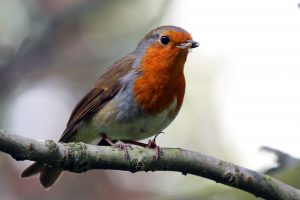How does a robin know which way to fly? This has been a scientific puzzle since the 1800s. European robins, Erithacus rubecula, are migratory birds that fly between Southern Europe and North Africa to escape harsh winters. Few wrong turns can easily land them in the coldest winter in Europe yet every year migratory birds fly to warmer places.

European robin. Source: Wikimedia Commons
The Hore group at the University of Oxford proposed that perhaps this biological compass phenomena may be best explained by quantum biology. The principal from a quantum biology perspective is that when photon hits the retina of the bird’s eyes, it excites the electrons in a protein called cryptochrome. These excited electrons then exist in different spatial locations yet influence each other which is an effect known as quantum entanglement. But the challenge is that can a quantum effect really last long enough to contribute to a bird’s navigation?
The researchers used computational methods to study the radical pairs involved which are pairs of bound molecules with an unpaired electron each. They discovered that the ratio of radical pairs that follow the two chemical pathways change when exposed to a magnetic field similar to that of the Earth. Essentially, they are proposing that the birds are converting Earth’s magnetic field by a chemical reaction sensitive to subtle quantum effects.
This research has profound implications in Chemistry as many organic semiconductors, such as OLEDs which are widely used in displays for phones, televisions, computers, etc., show similar magnetic properties as the radical pairs studied here, the research team believes that findings from this study can help develop sustainable and inexpensive electronic devices.

Most Apple products are dependent on OLEDs for their cutting edge display. Source: Maxpixel
The Hore Group did not prove or disprove the quantum biology theory for a biological compass; however, they attacked the puzzle from a unique perspective by showing why it’s possible. This is an important study because this was one of the first credible evidence that nature might be using quantum mechanics to its advantage. These findings have immense implications in Science as it raises the questions: can nature teach us how to build better machines? Can we learn how nature uses and preserves these quantum chemistry effects to develop quantum technologies such as quantum computers, nanochemistry in medical treatment, etc. Physicist Jim Al-Khalili did a TED Talk on how quantum biology might explain life’s biggest questions which further explores the potential scope of this field.
Overall, quantum biology is a coming of age controversial field with limited evidence; It’s new and speculative but I do believe it’s built on solid science.
Mia Hasan
Mon, Oct 23
